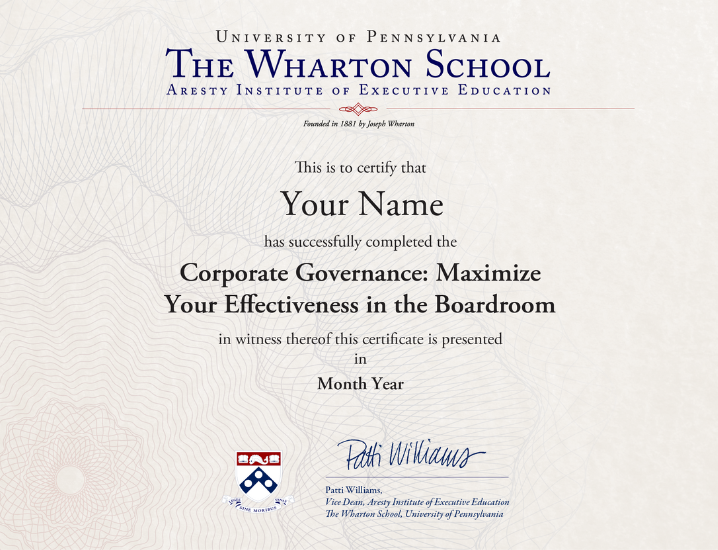
Corporate Governance: Maximize Your Effectiveness in the Boardroom
Drive strategic directions and succeed as a board member
Elevate your board leadership with the Corporate Governance program
The Corporate Governance: Maximize Your Effectiveness in the Boardroom program from Wharton Executive Education empowers current and aspiring board members and senior executives to strengthen their governance expertise and drive boardroom effectiveness in today’s complex business landscape. As organizations face increasing governance challenges and stakeholder scrutiny, effective corporate governance frameworks are critical for ensuring transparency, accountability, and sustainable performance management.
Led by Wharton’s world-renowned faculty, this six-week online executive education program blends academic insights with real-world boardroom perspectives to help you master financial oversight, risk management, and ethical leadership. You’ll gain the strategic understanding and practical tools needed to navigate complex board dynamics and lead with confidence in any corporate setting.
155%
67%
Watch the program preview
Get a firsthand look at how the Corporate Governance program strengthens your boardroom leadership and governance expertise.

Key takeaways
Wharton’s Corporate Governance program explores the role, structure, and responsibilities of corporate governance frameworks to help you succeed as a board member. This executive education program will enable you to:
Define the board’s role and responsibilities as well as characteristics of successful board leaders
Ensure proactive governance and learn how to prepare for potential risks
Recognize key considerations of compensation and succession planning
Define strategies for board members, executives, and other environmental, social, and governance (ESG) integrators to respond to conflicting demands and societal challenges to their organization
Plan for how to manage the competing interests of stakeholders and shareholders
What you will learn
The Corporate Governance: Maximize Your Effectiveness in the Boardroom program from Wharton Executive Education will prepare C-suite executives and corporate directors to serve effectively in today’s dynamic governance landscape.
You will learn to define the board’s role in driving strategic direction, strengthen risk management and financial reporting capabilities, and balance shareholder interests to promote organizational sustainability. The program also emphasizes ethical decision making, board effectiveness, and long-term value creation, equipping you with the insights and tools to lead confidently in the boardroom.
Program modules
Gain the strategic insight and practical skills to strengthen decision-making processes, enhance value creation, and address contemporary challenges while learning from industry experts to serve effectively in the boardroom.
Begin the program by learning the basic structure and responsibilities of a board as an organization’s top level of governance.
Explore the features of an inclusive board culture and its role in leveraging diverse talent.
Articulate the role of the board in CEO compensation and succession planning.
Describe how a board should manage crisis situations and/or internal investigations.
Gain insights into the challenges and benefits inherent in ESG and outline considerations for developing an optimal organization-level ESG strategy.
Recognize the influence of non-market factors (such as external social, political, and legal forces) on organizations.
Program experience


Participate in quick, interactive polls to compare viewpoints and reflect on key governance dilemmas.

Capture personal insights and connect course concepts to your board leadership goals through guided reflection prompts.

Explore real-world governance scenarios and board decisions illustrated through cases from leading global companies.

Apply governance frameworks to practical, scenario-based assignments that reinforce learning and build problem-solving skills.

Join live sessions with faculty for clarifications, discussions, and deeper exploration of complex governance topics.

Practice key concepts with hands-on exercises designed to strengthen decision-making and boardroom readiness.

Test your knowledge and track your progress with short quizzes that reinforce understanding of each module.
Industry examples
The Corporate Governance program provides real-world learning examples to help you understand the realities of corporate governance in practice through the experiential lens of industry experts and associate professors, focusing on decision-making processes, value creation, and addressing contemporary challenges faced by modern boards.

Analyze Apple’s board demographics to understand the value of diversity in background, experience, and skill sets.

Understand the importance of board accountability and how a captive board can reduce oversight in governance via this example of Disney’s board being comprised of friends and acquaintances of its president, Michael Ovitz.

Understand the impact of non-market factors through this example of the pharmaceutical organization, Mylan.

See how some companies (Starbucks, in this case) take diversity to heart and the influence that a diverse board can have.

Recognize the impact of diversity in background, experience, and skill sets through an analysis of Wells Fargo’s board composition.
Who is this program for?
The Corporate Governance: Maximize Your Effectiveness in the Boardroom program is designed to give participants a deeper understanding of corporate governance and help boost their effectiveness on a corporate board.
The program is ideal for:
Current board members and senior executives interested in joining a board who want to understand the various aspects of proactive governance and help drive strategic direction, risk oversight, and the establishment of compensation
C-suite executives looking to explore the duties and nuances of board service, help strengthen their company’s financial return; enterprise risk management, and governance diversity; and learn to effectively take on existing and emerging issues
Attorneys engaged in legal services who are seeking to learn the fundamentals of corporate governance from a variety of angles and how to assess the effectiveness and execution of governance roles and responsibilities
Corporate governance handbook
The Corporate Governance program enables you to explore the processes and responsibilities that drive corporate governance, offering a deeper understanding of how effective boards operate and make informed decision-making processes. The program includes a handbook where you can reflect on key takeaways, ensure compliance with best practices, and learn to collaborate with various stakeholders to create long-term value as a successful board member. Topics addressed in the handbook include:
Laying the groundwork: Begin by drafting your director bio and exploring the importance of marketing yourself.
Conducting a personal skills audit: Assess your professional background to help you understand your strengths and any critical gaps in your knowledge or experience for board positions you’re seeking.
Finding your director doppelganger: Focus on strategically networking with directors who possess experience/characteristic profiles that are similar to yours, as they can help point you toward boards that are looking for a candidate with your profile.
Demonstrating your grit: Be able to persuasively articulate your experience in crisis/adversity situations.
Completing a leadership style assessment: Consider how your style informs the way you would manage various stakeholders, as well as which stakeholders you’re most comfortable interacting with and/or advocating for in the boardroom.
Putting the pieces together: Define and characterize your personal guiding principles via a concise and effective board value statement.
Testimonials
Discover how this program has helped board members, senior executives, and governance professionals strengthen their impact and contribute more effectively at the highest levels.
Faculty
World-renowned Wharton faculty in the Corporate Governance: Maximize Your Effectiveness in the Boardroom program will help you navigate the complexities of modern board leadership. You will gain strategic insights into decision-making processes and compliance to strengthen governance effectiveness and create long-term organizational value.

Bantwal Family Goldman Sachs Presidential Associate Professor; Associate Professor of Management, Organizational Behavior, The Wharton School
Mary-Hunter McDonnell studies organizational behavior within challenging institutional contexts, such as contentious social environments and uncertain regulatory environments....
Guest speaker

Partner, Mayer Brown
Sean McDonnell is a partner in Mayer Brown's Washington D.C. office and a member of the global litigation and dispute resolution practice. Previously, Sean was an assistant Un...

Certificate
Upon successful completion of the Corporate Governance: Maximize Your Effectiveness in the Boardroom program, you will earn a digital certificate of completion from the Wharton School.
Note: After successful completion of the online program, your verified digital certificate will be emailed to you in the name you used when registering for the program. All certificate images are for illustrative purposes only and may be subject to change at the discretion of the Wharton School.
Boardroom Readiness Program
FAQs
What is a Corporate Governance program?
The Corporate Governance: Maximize Your Effectiveness in the Boardroom program from Wharton Executive Education is a six-week online learning journey for board members, corporate directors, and c-suite executives seeking to strengthen their understanding of governance frameworks, board responsibilities, and ethical leadership.
It combines core modules on strategic direction, risk management, and financial oversight with real-world case studies on accountability and board effectiveness. Participants gain the insights and tools needed to navigate complex governance challenges and drive long-term organizational success.
Is a Corporate Governance program worth it?
There are many executive education programs available for board leaders, and the value of any program depends on your goals, experience, and the skills you want to strengthen. Senior executives, current board members, and those aspiring to serve effectively on corporate boards often seek more than governance knowledge — they need the frameworks to lead with impact.
The Wharton Corporate Governance: Maximize Your Effectiveness in the Boardroom program provides a comprehensive curriculum that integrates industry expert insights, faculty-led sessions, and governance frameworks to enhance ethical leadership, ensure compliance, and create long-term value for organizations and stakeholders.
Which is the best Corporate Governance course?
The best corporate governance course depends on your experience level, board exposure, and leadership aspirations. A strong program should offer faculty director expertise, a focus on decision-making processes, and exposure to real-world case studies. Wharton’s Corporate Governance program combines research-driven instruction, board effectiveness strategies, and insights into contemporary challenges like shareholder activism and ESG, preparing participants to lead with confidence in any governance environment.
Can a course help me become a board member
A corporate governance course can accelerate your readiness for a board role by building your governance expertise, strengthening your understanding of board’s role and fiduciary responsibilities, and improving your decision-making processes. The Wharton Corporate Governance program helps you develop essential skills in risk oversight, ethical decision making, and financial reporting, preparing you to serve effectively and contribute meaningfully to a corporate board.
How to become a corporate board member?
Becoming a corporate board member requires a mix of leadership experience, strategic insight, and governance literacy. Many professionals advance to the boardroom after serving in C-suite roles, finance, or management. Enrolling in a program like Wharton’s Corporate Governance program helps you gain a deeper understanding of board dynamics, stakeholder management, and best practices, enabling you to transition confidently into governance leadership.
What education do you need to join a corporate board?
Board members come from diverse academic and professional backgrounds — often combining business acumen, financial literacy, and leadership experience. Wharton’s Corporate Governance program bridges these disciplines by helping participants master strategic direction, compliance, and value creation frameworks essential for board success. You’ll also gain exposure to faculty directors, industry experts, and real-world governance scenarios to strengthen your qualifications.
How should I choose a Corporate Governance program?
Choosing the right corporate governance program depends on your career goals, prior experience, and desired learning outcomes. Factors to consider include faculty expertise, curriculum relevance, governance best practices, and peer learning opportunities. Wharton’s Corporate Governance program stands out for its combination of research-backed instruction, interactive case discussions, and long-term value creation focus — helping leaders translate governance theory into actionable boardroom impact.
Why take a Corporate Governance course instead of relying on experience?
While board experience is valuable, a structured corporate governance course deepens your knowledge and provides exposure to emerging issues and ethical challenges that boards face today. The Wharton Corporate Governance program blends academic insight with real-world governance practices, enabling participants to refine their decision-making processes, engage with industry experts, and enhance their ability to lead organizations toward sustainable and compliant governance.
What training should the board of directors have?
Board members benefit from opportunities that help refine their understanding of corporate governance, strengthen ethical decision-making, and enhance oversight of risk management and financial performance. The Corporate Governance: Maximize Your Effectiveness in the Boardroom program from Wharton Executive Education offers valuable insights into the board’s role, promotes compliance, and supports engagement with various stakeholders to advance governance best practices and foster long-term value creation.
How do you become a board of director?
Becoming a board of director typically requires a blend of leadership experience, strategic perspective, and governance knowledge. Professionals often advance to the boardroom after serving in c-suite executive or senior management roles that involve shaping strategic direction and overseeing risk management. The Corporate Governance: Maximize Your Effectiveness in the Boardroom program from Wharton Executive Education helps aspiring corporate directors build the skills to serve effectively, strengthen ethical decision-making, and engage with various stakeholders to drive long-term value creation.
What training should a director have?
Directors can benefit from opportunities that deepen their understanding of the board’s role, reinforce ethical decision-making, and strengthen their approach to risk management and financial oversight. The Corporate Governance: Maximize Your Effectiveness in the Boardroom program from Wharton Executive Education offers practical insights for C-suite executives and corporate directors to enhance board effectiveness, uphold compliance, and foster long-term value while contributing more strategically to organizational goals.
How do I know if this program is right for me?
After reviewing the information on the program landing page, we recommend you submit the short form above to gain access to the program brochure, which includes more in-depth information. If you still have questions on whether this program is a good fit for you, please email learner.success@emeritus.org, and a dedicated program advisor will follow-up with you very shortly.
Are there any prerequisites for this program?
Some programs do have prerequisites, particularly the more technical ones. This information will be noted on the program landing page, as well as in the program brochure. If you are uncertain about program prerequisites and your capabilities, please email us at the ID mentioned above.
Note that, unless otherwise stated on the program web page, all programs are taught in English and proficiency in English is required.
What is the typical class profile?
More than 50 percent of our participants are from outside the United States. Class profiles vary from one cohort to the next, but, generally, our online certificates draw a highly diverse audience in terms of professional experience, industry, and geography — leading to a very rich peer learning and networking experience.
What other dates will this program be offered in the future?
Check back to this program web page or email us to inquire if future program dates or the timeline for future offerings have been confirmed yet.
How do I become a board member ?
To become a board member, you need industry expertise, leadership experience, and corporate governance training. Certificates like Wharton Executive Education’s Corporate Governance program can help you build essential skills.
What are the benefits of Wharton Executive Education’s Corporate Governance program for aspiring board directors ?
The Wharton Executive Education Corporate Governance certificate validates your expertise in governance, risk management, and compliance. It helps professionals qualify for board positions and strengthen leadership credibility.
What are the ideal qualifications of a board member ?
A board member should have leadership experience, financial acumen, strategic decision-making skills, and governance knowledge. Many executives enhance their qualifications with governance training, such as the Wharton Executive Education Corporate Governance program.
How does Wharton Executive Education’s program help with board readiness ?
The program provides board governance training, leadership strategies, and industry case studies to prepare professionals for board roles.
Can independent directors benefit from this program ?
Yes, independent directors gain critical insights into governance frameworks, risk assessment, and compliance best practices.
What does Wharton Executive Education’s Corporate Governance program cover ?
This program covers key topics, including board responsibilities, corporate ethics, financial governance, enterprise strategy, and risk management.
How much time is required each week?
Each program includes an estimated learner effort per week. This is referenced at the top of the program landing page under the Duration section, as well as in the program brochure, which you can obtain by submitting the short form at the top of this web page.
How will my time be spent?
We have designed this program to fit into your current working life as efficiently as possible. Time will be spent among a variety of activities including:
Engaging with recorded video lectures from faculty
Attending webinars and office hours, as per the specific program schedule
Reading or engaging with examples of core topics
Completing knowledge checks/quizzes and required activities
Engaging in moderated discussion groups with your peers
Completing your final project, if required
The program is designed to be highly interactive while also allowing time for self-reflection and to demonstrate an understanding of the core topics through various active learning exercises. Please email us if you need further clarification on program activities.
What is it like to learn online with the learning collaborator, Emeritus?
More than 300,000 learners across 200 countries have chosen to advance their skills with Emeritus and its educational learning partners. In fact, 90 percent of the respondents of a recent survey across all our programs said that their learning outcomes were met or exceeded.
All the contents of the course would be made available to students at the commencement of the course. However, to ensure the program delivers the desired learning outcomes the students may appoint Emeritus to manage the delivery of the program in a cohort-based manner the cost of which is already included in the overall course fee of the course.
A dedicated program support team is available 24/5 (Monday to Friday) to answer questions about the learning platform, technical issues, or anything else that may affect your learning experience.
How do I interact with other program participants?
Peer learning adds substantially to the overall learning experience and is an important part of the program. You can connect and communicate with other participants through our learning platform.
What are the requirements to earn the certificate?
Each program includes an estimated learner effort per week, so you can gauge what will be required before you enroll. This is referenced at the top of the program landing page under the Duration section, as well as in the program brochure, which you can obtain by submitting the short form at the top of this web page. All programs are designed to fit into your working life.
This program is scored as a pass or no-pass; participants must complete the required activities to pass and obtain the certificate of completion. Some programs include a final project submission or other assignments to obtain passing status. This information will be noted in the program brochure. Please email us if you need further clarification on any specific program requirements.
What type of certificate will I receive?
Upon successful completion of the program, you will receive a smart digital certificate. The smart digital certificate can be shared with friends, family, schools, or potential employers. You can use it on your cover letter, resume, and/or display it on your LinkedIn profile.
The digital certificate will be sent approximately two weeks after the program, once grading is complete.
Can I get the hard copy of the certificate?
No, only verified digital certificates will be issued upon successful completion. This allows you to share your credentials on social platforms such as LinkedIn, Facebook, and Twitter.
Do I receive alumni status after completing this program?
No, there is no alumni status granted for this program. In some cases, there are credits that count toward a higher level of certification. This information will be clearly noted in the program brochure.
How long will I have access to the learning materials?
You will have access to the online learning platform and all the videos and program materials for 12 months following the program start date. Access to the learning platform is restricted to registered participants per the terms of agreement.
Is this program equivalent to NACD certification ?
No, the Wharton Executive Education Corporate Governance program is not an NACD certification. This program is designed to provide executive education on board leadership, governance best practices, and strategic decision making. While it offers a certificate of completion from Wharton Executive Education, it does not grant an industry certification like the NACD Directorship Certification or any other certifications.
However, this program equips participants with valuable governance knowledge and leadership skills that can complement formal board certification programs.
What equipment or technical requirements are there for this program?
Participants will need the latest version of their preferred browser to access the learning platform. In addition, Microsoft Office and a PDF viewer are required to access documents, spreadsheets, presentations, PDF files, and transcripts.
Do I need to be online to access the program content?
Yes, the learning platform is accessed via the internet, and video content is not available for download. However, you can download files of video transcripts, assignment templates, readings, etc. For maximum flexibility, you can access program content from a desktop, laptop, tablet, or mobile device.
Video lectures must be streamed via the internet, and any livestream webinars and office hours will require an internet connection. However, these sessions are always recorded, so you may view them later.
How much does the Wharton Corporate Governance program cost?
The fee for the Wharton Corporate Governance: Maximize Your Effectiveness in the Boardroom program can be found on the official program page. This includes access to academic content, live sessions, discussion boards, and faculty interaction. Participants can also explore flexible payment plans, early registration benefits, and group enrollment options for organizations and various stakeholders.
Can I still register if the registration deadline has passed?
Yes, you can register up until seven days past the published start date of the program without missing any of the core program material or learnings.
What is the program fee, and what forms of payment do you accept?
The program fee is noted at the top of this program web page and usually referenced in the program brochure as well.
Flexible payment options are available (see details below as well as at the top of this program web page next to FEE).
Tuition assistance is available for participants who qualify. Please email learner.success@emeritus.org.
What if I don’t have a credit card? Is there another method of payment accepted?
Yes, you can do the bank remittance in the program currency via wire transfer or debit card. Please contact your program advisor, or email us for details.
I was not able to use the discount code provided. Can you help?
Yes! Please email us with the details of the program you are interested in, and we will assist you.
How can I obtain an invoice for payment?
Please email us your invoicing requirements and the specific program you’re interested in enrolling in.
Is there an option to make flexible payments for this program?
Yes, the flexible payment option allows a participant to pay the program fee in installments. This option is made available on the payment page and should be selected before submitting the payment.
How can I obtain a W9 form?
Please connect with us via email for assistance.
Who will be collecting the payment for the program?
Emeritus collects all program payments, provides learner enrollment and program support, and manages learning platform services.
Are there any restrictions on the types of funding that can be used to pay for the program?
Program fees for Emeritus programs with Wharton Executive Education may not be paid for with (a) funds from the GI Bill, the Post-9/11 Educational Assistance Act of 2008, or similar types of military education funding benefits or (b) Title IV financial aid funds.
What is the program refund and deferral policy?
For the program refund and deferral policy, please click the link here.
Didn't find what you were looking for? Write to us at learner.success@emeritus.org or Schedule a call with one of our Program Advisors or call us at +1 680 205 5118 (US) / +44 185 845 9995 (UK) / +65 3135 1422 (SG)
Flexible payment options available.
Starts On
